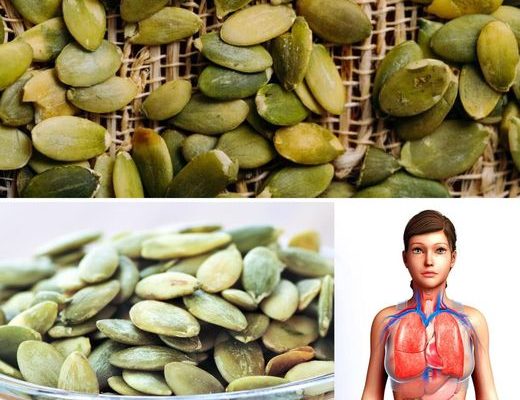Here are 9 reasons to start eating pumpkin seeds this fall and reap their incredible benefits!
Pumpkin seeds, often overlooked during the fall season, are a nutritional powerhouse that should be part of your diet year-round, but especially in the fall when pumpkins are abundant.
These tiny seeds are packed with essential nutrients and offer a wide range of health benefits.
Whether you eat them raw, roasted, or added to your favorite dishes, pumpkin seeds are a simple, delicious way to boost your overall health.
Here are 9 reasons to start eating pumpkin seeds this fall and reap their incredible benefits!
1. Rich in Essential Nutrients
Pumpkin seeds are loaded with essential vitamins and minerals that your body needs for optimal function.
A handful of pumpkin seeds provides a good amount of magnesium, zinc, potassium, and iron, all of which contribute to improved energy, bone health, and immune function.
- Magnesium: Helps regulate muscle and nerve function, blood sugar levels, and blood pressure.
- Zinc: Supports immune function, wound healing, and cell growth.
- Iron: Promotes healthy red blood cells and oxygen transport in the body.
2. Boosts Heart Health
Pumpkin seeds are an excellent source of magnesium, which is crucial for maintaining heart health. Magnesium helps regulate blood pressure, balance cholesterol levels, and promote healthy heart rhythms.
Additionally, the antioxidants in pumpkin seeds help protect the cardiovascular system by reducing inflammation and oxidative stress.
Tip: Eating pumpkin seeds regularly can help reduce your risk of heart disease and improve overall heart health.
3. High in Antioxidants
Pumpkin seeds are rich in antioxidants, including carotenoids and vitamin E, which help protect your cells from damage caused by free radicals.
These antioxidants play a key role in reducing inflammation, slowing down the aging process, and reducing your risk of chronic diseases like cancer.
Tip: Consuming pumpkin seeds can provide a natural boost to your immune system and help keep your body healthy during the fall and winter months.
4. Supports Prostate Health
Pumpkin seeds have long been associated with promoting prostate health, particularly in men.
They contain a compound called phytosterol, which can help reduce the size of an enlarged prostate, a condition known as benign prostatic hyperplasia (BPH). The high zinc content in pumpkin seeds also supports overall male reproductive health.
Tip: Incorporating pumpkin seeds into your diet may help reduce the symptoms of BPH and improve prostate health.
5. Improves Sleep Quality
Pumpkin seeds are a natural source of tryptophan, an amino acid that the body converts into serotonin and melatonin—two key hormones that regulate sleep.
Eating a small amount of pumpkin seeds before bed can help you relax and improve the quality of your sleep.
Tip: Snack on a handful of pumpkin seeds a few hours before bedtime to support better sleep and combat insomnia naturally.
6. Promotes Healthy Skin
The rich supply of antioxidants, zinc, and healthy fats in pumpkin seeds makes them excellent for skin health.
Zinc helps repair damaged skin and promote collagen production, while the antioxidants protect the skin from environmental damage, keeping it looking youthful and radiant.
Tip: Adding pumpkin seeds to your diet can help improve your skin’s texture and reduce signs of aging, like wrinkles and fine lines.
7. Aids in Weight Management
Pumpkin seeds are high in fiber and protein, both of which help you feel fuller for longer, reducing the likelihood of overeating.
The healthy fats in pumpkin seeds also promote satiety, making them an excellent snack for those trying to maintain or lose weight.
Tip: Incorporate pumpkin seeds into your meals or snacks to curb hunger and promote weight loss or maintenance.
8. Balances Blood Sugar Levels
The protein, fiber, and healthy fats in pumpkin seeds can help regulate blood sugar levels and prevent spikes that lead to energy crashes.
Eating pumpkin seeds regularly can improve insulin sensitivity, making them a good choice for people with diabetes or those at risk of developing it.
Tip: Include pumpkin seeds as a snack or topping for salads and yogurt to help balance your blood sugar throughout the day.
9. Supports Bone Health
Pumpkin seeds are a good source of magnesium and phosphorus, both of which are essential for maintaining strong bones.
Magnesium helps the body absorb calcium more efficiently, supporting bone density and preventing conditions like osteoporosis.
Tip: Adding pumpkin seeds to your diet can help maintain bone strength, especially as you age, reducing the risk of fractures and bone loss.
How to Incorporate Pumpkin Seeds into Your Diet
Here are a few simple and delicious ways to add pumpkin seeds to your daily routine:
- Roasted Pumpkin Seeds: Toss raw pumpkin seeds in olive oil and season with salt, pepper, or your favorite spices, then roast them in the oven for a crunchy, savory snack.
- Salad Topper: Sprinkle pumpkin seeds on top of salads for added crunch and nutrients.
- Smoothies: Blend a tablespoon of pumpkin seeds into your morning smoothie for an extra boost of protein and healthy fats.
- Oatmeal or Yogurt: Add pumpkin seeds to your oatmeal or yogurt to increase the nutrient content and flavor.
- Baking: Mix pumpkin seeds into homemade granola, muffins, or bread for a nutritious twist.
Pumpkin seeds are a simple and delicious way to boost your health this fall.
From supporting heart health and improving sleep to promoting healthy skin and aiding in weight management, pumpkin seeds offer a wide range of benefits.




